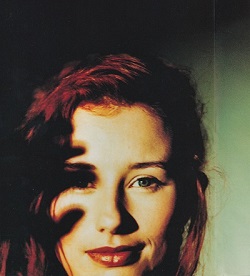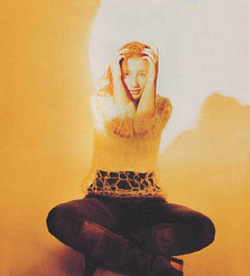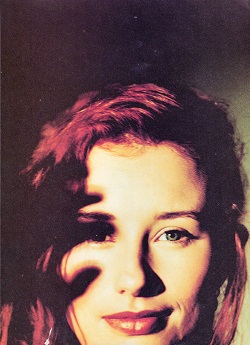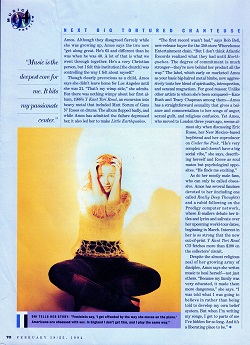|

songs | interviews | photos | tours | boots | press releases | timeline
Entertainment Weekly (US)
February 11, 1994
Special Winter Double Issue
"The State of Music"
 
Next Big Tortured Chanteuse
Tori Amos
A minister's daughter's sexy edge takes her from cult to mainstream
by Dana Kennedy
Flame-haired singer-songwriter Tori Amos usually holds audiences in thrall, punctuating her complex and emotional performances with a lor of serious sexual writing at the piano. But in her new video, "God," the single from her third album, the just-released Under the Pink, Amos is nearly upstaged by rats. About 140 of them. "I wasn't scared of them -- they're scared of us," says Amos. "But they'd crawl up my dress while I was singing, and it tickled."
Amos, 30, wants to do more than merely tickle viewers with the provocative video. "It's about different life rituals, and we wanted to be accurate," she says. "Rats in some East Indian temples run free, and when they crawl all over someone, that person is said to be blessed." But accuracy went out the window when it cam time to depict Fundamentalist Christian rituals with rattlesnakes. "They weren't real rattlers," she admits. "Being a minister's daughter, you know you have to save yourself. I don't have that belief that God will come rescue me if I tempt him."
Saving yourself is the thread that runs through Under the Pink, arguably the flip side to 1992's critically acclaimed and gold-selling Little Earthquakes. Both albums contain Amos' trademark raw lyrics and spare but intricate melodies. But while Little Earthquakes included such chilling songs as "Me and a Gun," the a capella rendition of how Amos felt during a real-life sexual assault, her new album is about moving forward -- sometimes with irreverence. "God sometimes you just don't come through," Amos sings in "God." "Do you need a woman to look after you?"
"Little Earthquakes was about hatching, and acknowledging things for the first time," Amos says. "But Under the Pink is about breaking from the victim perspective. About how there's no room for self-pity because you can change things yourself."
Amos makes that sound like a recent discovery, but she's been changing things for herself with amazing regularity since early childhood. She was born in North Carolina, the daughter of a stern Methodist minister and a more "easygoing" mother. Amos, who has an older sister and brother, began playing the piano at 2 and entered Baltimore's Peabody Conservatory at 5 before getting kicked out at 11 for rebelling against the rigid classical training. "My whole family is very bright," she says. "My grandmother could give you an interpretation of Shelley that would curl your toes." But it was her father whose influence was strongest. "I definitely wanted his approval," says Amos. Although they disagreed fiercely while she was growing up, Amos says the two now "get along great. He's 65 and different that he was when he was 40. A lot of that is what we went through together. He's a very Christian person, but I felt this institution [the church] was controlling the way I felt about myself."
Though clearly precocious as a child, Amos says she didn't leave home for Los Angeles until she was 21. "That's my wimp side," she admits. But there was nothing wimpy about her first album, 1988's Y Kant Tori Read, an excursion into heavy metal that included Matt Sorum of Guns N' Roses on drums. The album flopped badly, and while Amos has admitted the failure depressed her, it also led her to make Little Earthquakes.
"The first record wasn't bad," says Bob Bell, new-release buyer for the 350-store Wherehouse Entertainment chain. "But I don't think Atlantic Records realized what they had until Earthquakes. The degree of commitment is much stronger -- they're now behind her product all the way." The label, which early on marketed Amos as your basic big-haired bimbo, now aggressively touts her blend of spirituality, introspection, and sensual magnetism. For good reason: Unlike other artists to whom she's been compared -- Kate Bush and Tracy Chapman among them -- Amos has a straightforward sexuality that gives a balance and commercialism to her songs of anger, sexual guilt, and religious confusion. Yes Amos, who moved to London three years ago, seems almost shy when discussing Eric Rosse, her New Mexico-based boyfriend and her coproducer on Under the Pink. "He's very complex and doesn't have a big social vibe," she says, describing herself and Rosse as soul mates but psychological opposites. "He finds me exciting."
As do her mostly male fans, who can only be called obsessive. Amos has several fanzines devoted to her (including one called Really Deep Thoughts) and a rabid following on the Prodigy computer network, where E-mailers debate her titles and lyrics and salivate over her upcoming world-tour dates, beginning in March. Interest in her is so strong that the now out-of-print Y Kant Tori Read fetches more than $100 on the colleectors' circuit.
Despite the almost religious zeal of her growing army of disciples, Amos says she writes music to heal herself -- not just others. "Because my family was very educated, it made them more dangerous," she says. "I was told what I was going to believe in rather than being told to develop my own belief system. But when I'm writing my songs, I get to parts of me I've hidden for so long. And it's a liberating place to be."
Photo Caption: Tori tells her story: "Feminists say, 'I get offended by the way she moves on the piano.' Americans are obsessed with sex. In England I don't get this, and I play the same way."
original article


[scans by Sakre Heinze]
[transcribed by jason/yessaid]
t o r i p h o r i a
tori amos digital archive
yessaid.com
|